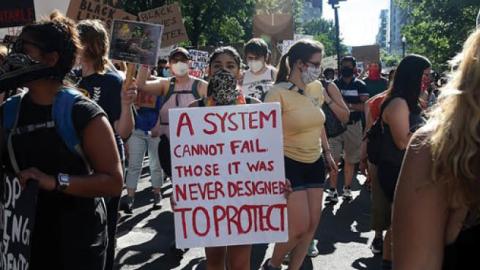I've been in downtown Washington, D.C., several times in the past few days and have watched protesters insist on accountability for the killing of George Floyd — an appropriate demand that our system function and bring justice. Less encouraging are the banners carried by another group of demonstrators saying, "The system is not broken. It was built this way."
These signs assert that the system is incapable of providing justice and should be replaced. But what political system are they proposing? This more radical position overlooks the fact that there is actually no system better suited than the one in the United States to reducing and preventing outrages like the one that ended Floyd's life while he was in police custody.
The group of protesters who want to replace our system with an as-yet-to-be-identified superior one seem blinded to the fact that discrimination against minority peoples is a pervasive global phenomenon rather than merely American. And while the U.S. has an imperfect history of achieving racial justice, its system has allowed citizens and leaders to work to improve that record.
A virtue of the constitutional democracy that America pioneered in the world is that its grassroots system of popular representation encourages citizens to change the government from within. Pulling down the existing system ignores this, as does the fact that in non-democratic states the best — the only — recourse for change is violent destruction of the government from the outside. Vladimir Lenin in Russia and Mao Zedong in China did not achieve power at the ballot box. Neither Egypt’s Hosni Mubarak nor Libya’s Moammar Gadhafi lost their position through legal processes. Change came from without because it could not come from within.
Of course, these authoritarian states are far from paragons of equality and acceptance of different groups. Just ask the Muslim Uighurs in China or the Coptic Christians in Egypt. But even Western democracies do not do better in integration, opportunity and respect for difference than the U.S.
According to a 2019 Pew Research report that ranked positive attitudes toward diversity in 27 nations, the U.S. was in fourth place, with 61 percent in favor of increasing diversity, only behind the United Kingdom and Canada by 1 percentage point. (The top two countries in the survey are Indonesia and South Korea at 76 percent and 68 percent, respectively. But Indonesia’s middling ranking on the Cato Institute’s Human Freedom Index undermines any notion that it is actually a better model for justice and equality, while South Korea is a largely ethnically homogenous state, so also not a good model of inclusivity and integration.)
Elsewhere, the results are worse. Spain and Sweden were the next most-supportive at 58 percent and 56 percent, respectively, with fewer than half of the French (49 percent) backing more diversity. Italy and Hungary oppose diversity more than support it, while the home of democracy, Greece, finds merely 17 percent who like the idea of greater diversity.
Meanwhile, there is no country free of racism and discrimination. Differences in reporting procedures and legal standards make comparing American and European rates of hate crimes difficult, but many European Union member states are clearly saddled with the problem. The rise of extreme right-wing political parties, anti-Semitism and anti-Roma sentiment are some of the most salient examples of Europe’s long tradition of mistreating minorities.
Today, in the U.S., African Americans, Latinos, Native Americans and Asians make up 22 percent of Congress. That is roughly the same as their proportion of the American public, which is 76 percent white, a sign of progress toward more equitable national representation. The picture is different in Europe, where minorities comprise at least 10 percent of the total population, while their representation in the European Parliament amounts to 5 percent. And since the beginning of this century, the U.S. stands out for twice electing an African American to the nation’s highest office.
Moreover, most Americans are disgusted by Floyd’s death and other police killings of innocent men and women, whatever their race, ethnicity or religion. This is not consistent with descriptions of the U.S. as a racist country wholly unable to address one of the world’s most entrenched divides.
In fact, the strides we’ve been able to take in moving toward racial justice show what the American system has to offer in contrast to so many other places. Coming out of the Civil War and the Reconstruction, the U.S. integrated the military, schools and professions, and the success of the civil rights movement broadened economic, educational and political opportunities for nonwhites.
Indeed, using liberal democracy to fight the evils within society has resulted in large steps toward the goal of racial justice in the U.S. If those who now insist that our system must be uprooted because it is the problem are successful in tearing it down, the hopes of decent men and women for a more just society will disappear in the rubble.
The Floyd killing demands justice, but it should also make us think about where we are headed as a nation if the idea of the U.S. as an oppressor state — and the insistence that our system cannot function — gains political traction. Radical narratives imply an interest in settling scores, not achieving justice, and can lead to more division and civil violence.
When President Abraham Lincoln took office, his initial policy was based on the idea that the principles of the Declaration of Independence as embodied in the Constitution must eventually end slavery, even as rebellious states seceded and turned their guns on Union troops. It’s why Lincoln put preserving the Union above all else. Lincoln’s faith in the principles of "the system" is still warranted; his warning that “a house divided against itself cannot stand” still applies.
The radicals today offer no alternative to our representative politics, and their effort to paint the U.S. as an oppressor will not unite us. It will do the exact opposite.
Read in NBC















